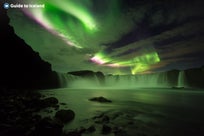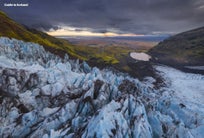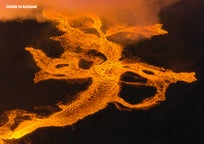
The Complete Guide to the 2023 Sundhnukagigar Volcanic Eruption

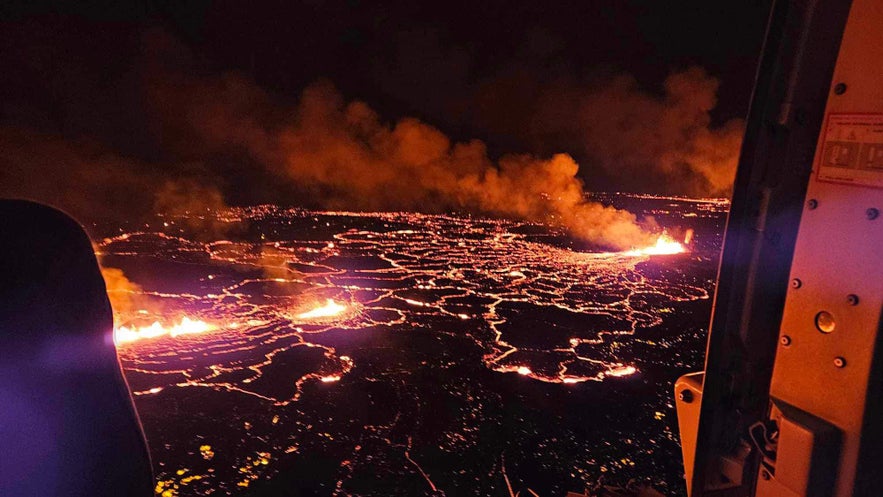
On December 18th, 2023, the ground in the Reykjanes peninsula began rumbling once more. At 10:17 PM local time, the night sky near the town of Grindavik lit up as the magma that had been circulating below ground for weeks found its way to the surface by the Sundhnukagigar crater volcano. Iceland was experiencing yet another eruption, the fourth in three years. It would then be followed by a fifth eruption in January 2024, this time at Hagafell, even closer to Grindavik, and four more eruptions, again in Sundhnukagigar, in February, March, May, and August of 2024.
This fourth Reykjanes eruption, while powerful at first, quickly petered out. While scientists were concerned that new fissures might suddenly open, the volcanic activity lessened steadily until, on December 21st, the eruption was declared officially over.
If you want to see the aftermath of the eruption, as well as the aftermath of the eruptions in previous years, check out the available volcano tours. The best way to see the scope of the eruptions is with a birdseye view on a helicopter tour of the eruption area.
- See more about the 2024 Sundhnukagigar Volcanic Eruptions
- Learn about the 2024 Hagafell Volcanic Eruption Near Grindavik
- For more: The Complete Guide to the 2023 Eruption by Litli-Hrutur Volcano
- See also: The Complete Guide to the 2021 Volcanic Eruption by Fagradalsfjall Volcano and the 2022 Fagradalsfjall Volcano Eruption
The Leadup to the Eruption by Grindavik
Just as before the eruptions in Fagradalsfjall in 2021 and 2022 and Litli-Hrutur in 2023, the Reykjanes region had been experiencing an increase in earthquake activity for weeks before but had since quieted down. The seismic activity was caused by a stream of magma flowing beneath the surface, but unlike eruptions in previous years, this one caused real concerns for inhabitants in the area.
Weeks before the eruption, the inhabitants of Grindavik were forced to evacuate the town as magma was discovered flowing only a few hundred feet below the surface of the town. All inhabitants and animals were safely evacuated, and over the next weeks, many valuables were salvaged from homes. Even though the eruption hadn't started, the seismic activity caused a great deal of damage to the town as cracks formed in the earth, as can be seen in the video above.
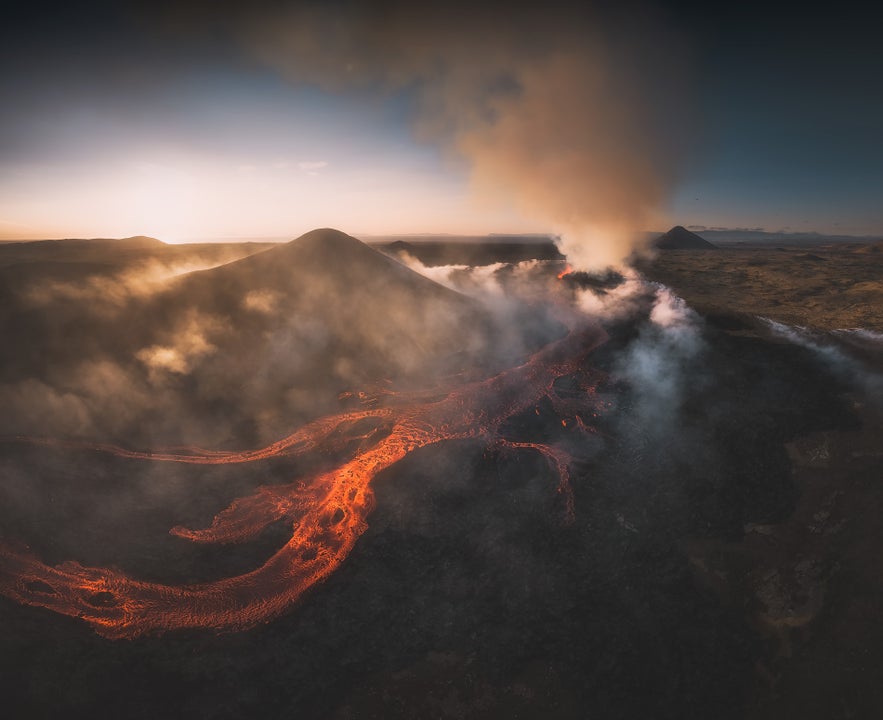
The 2023 eruption by Litli-Hrutur
The possibility of an eruption also caused concern for nearby infrastructure. The Svartsengi Power Plant, which provides both power and heat to the entire region, was under threat, as well as Iceland's largest tourist attraction, the Blue Lagoon, which had been closed down as well. Authorities took preventative measures to create defenses for Svartsengi (and, by extension, the Blue Lagoon) by erecting mounds of earth against possible eruption sites to serve as a wall against the flowing lava.
The 2023 Eruption by Grindavik
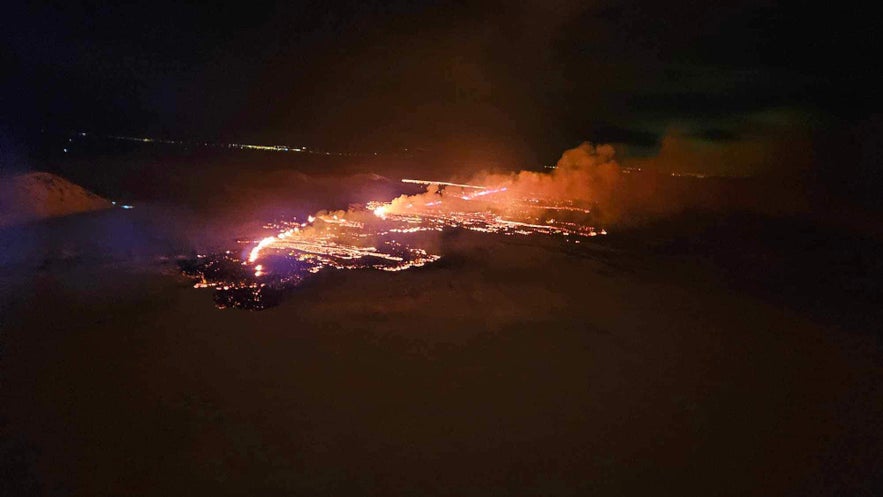 As the eruption began, all thoughts were with the people of Grindavik. The lava flow of the eruption was significantly higher than the eruptions of recent years in Reykjanes, and the fissure created reached a length of upwards of 2.5 miles (4 kilometers). A Civil Defence emergency level was declared, and police closed down nearby roads.
As the eruption began, all thoughts were with the people of Grindavik. The lava flow of the eruption was significantly higher than the eruptions of recent years in Reykjanes, and the fissure created reached a length of upwards of 2.5 miles (4 kilometers). A Civil Defence emergency level was declared, and police closed down nearby roads.
Thankfully, the eruption turned out to be what experts call a "best-case scenario," as the lava flowed away from the town, the Svartsengi power station, and the Blue Lagoon. Scientists closely monitored the situation to see if the fissure extended further south or if new fissures might open up, but thankfully, the eruption ended, and the people of Grindavik could breathe a sigh of relief.
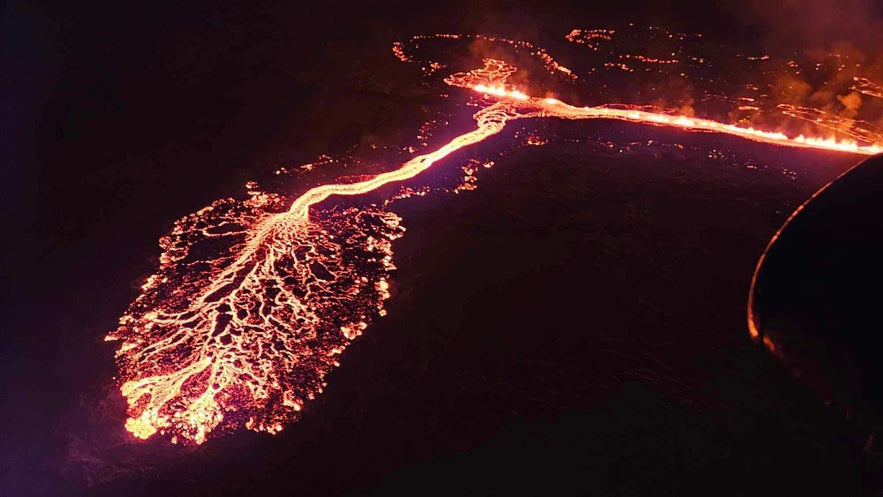 The eruption began with a bang, with a lava flow ten times more powerful than the eruptions in the peninsula in previous years. The lava field created covered an area of roughly 1.4 square miles (3.7 square kilometers).
The eruption began with a bang, with a lava flow ten times more powerful than the eruptions in the peninsula in previous years. The lava field created covered an area of roughly 1.4 square miles (3.7 square kilometers).
The following Sundhnukagigar eruptions were located further away from Grindavik than the Hagafell eruption, but they did manage to damage some infrastructure before dying down.
Will Sundhnukagigar erupt again? It's impossible to say, but the Reykjanes peninsula has been very active in recent years, so the Icelandic people and geologists everywhere will be keeping a close eye on the region!
That's it about the relatively short 2023 eruption of Sundhnukagigar! Let us know in the comments below if you have questions, and we will do our best to answer them.
Weitere interessante Artikel

Die Blaue Lagune in Island | Der ultimative Guide
Erfahre alles über die Blaue Lagune in Island. In diesem Guide findest du heraus, was die Blaue Lagune ist, wie du dorthin kommst, wann sie geöffnet ist und wann du sie am besten besuchen solltest....WeiterlesenDie 30 besten heißen Quellen und Thermalpools in Island
Schau dir diese Liste mit den besten heißen Quellen und Thermalpools in Island an. Wir verraten dir, wo du die besten natürlichen heißen Quellen sowie alle Spas und Thermalpools in Island findest....Weiterlesen
Ausbruch des Litli-Hrutur-Vulkans 2023 | Der komplette Guide
Erfahre alles, was du über den Ausbruch des Vulkans Litli-Hrutur in Island im Jahr 2023 wissen musst! Wie groß war die Eruption? Wie lange dauerte sie an? Ist es sicher, den Vulkan jetzt zu besuchen?...Weiterlesen

Lade Islands größten Reisemarktplatz auf dein Handy herunter, um deine gesamte Reise an einem Ort zu verwalten
Scanne diesen QR-Code mit der Kamera deines Handys und klicke auf den angezeigten Link, um Islands größten Reisemarktplatz in deine Tasche zu laden. Füge deine Telefonnummer oder E-Mail-Adresse hinzu, um eine SMS oder E-Mail mit dem Download-Link zu erhalten.



